PMC/PubMed Indexed Articles
Indexed In
- Academic Journals Database
- Genamics JournalSeek
- Academic Keys
- JournalTOCs
- China National Knowledge Infrastructure (CNKI)
- Scimago
- Access to Global Online Research in Agriculture (AGORA)
- Electronic Journals Library
- RefSeek
- Directory of Research Journal Indexing (DRJI)
- Hamdard University
- EBSCO A-Z
- OCLC- WorldCat
- SWB online catalog
- Virtual Library of Biology (vifabio)
- Publons
- MIAR
- University Grants Commission
- Geneva Foundation for Medical Education and Research
- Euro Pub
- Google Scholar
Useful Links
Share This Page
Journal Flyer

Open Access Journals
- Agri and Aquaculture
- Biochemistry
- Bioinformatics & Systems Biology
- Business & Management
- Chemistry
- Clinical Sciences
- Engineering
- Food & Nutrition
- General Science
- Genetics & Molecular Biology
- Immunology & Microbiology
- Medical Sciences
- Neuroscience & Psychology
- Nursing & Health Care
- Pharmaceutical Sciences
Resistance of commensal intestinal Escherichia coli and other enterics to co-trimoxazole and commonly used antibiotics in HIV/AIDS patients
2nd International Conference on Clinical Microbiology & Microbial Genomics
September 16-17, 2013 Hampton Inn Tropicana, Las Vegas, NV, USA
Kennedy D. Mwambete
Scientific Tracks Abstracts: J Microb Biochem Technol
Abstract:
Trimethoprim-sulfamethoxazole [co-trimoxazole (CXT)] has been recommended by WHO as prophylactic drug for HIV/ AIDS-patients against opportunistic infections. However, daily administration of CXT may reduce its efficacy to commensal intestinal Escherichia coli , thus increasing burden of CXT-resistant pathogens. CXT-resistance among enteric pathogens may impede empiric treatment strategies and worsen HIV/AIDS-patients? conditions. We investigated incidences of fecal E. coli resistance to CXT in 188 HIV/AIDS-patients over 18 years old, and determined changes in susceptibility of the bacteria to the drug. It was a prospective study conducted in Dar es Salaam, Tanzania involving collection of stool specimens prior to initiating CXT prophylaxis and after. Specimens were collected from patients on the 1 st , 4 th , and 24 th weeks upon commencing CXT prophylaxis. Susceptibility profiling of E. coli and other enteric bacteria to CXT and other widely used antibiotics were done using Kirby-Bauer disk diffusion method. On first visit, 143 (76.1%) enteric bacteria were isolates from 188 HIV/AIDS- patients. Of those, 123 (86%) were E. coli. About 98.6% (n=141) were resistant to CXT. On second visit, 76 (74.5%) E. coli isolate and 10 (9.8%) mixture of E. coli and other microbes and were isolated from 102 (54.2%) patients. Of those, 100 (98.4%) isolates exhibited resistance to CXT. On third visit, only 64 (34%) of 188 HIV/AIDS-patients had significant enteric bacteria, and of those 63 (98.4%) were resistant to CXT: 39(62.6%) E. coli, 13(15.9%) S. aureus and 10 (16%) E. coli plus others. About 53.2% (n=100) bacterial isolates were resistant to ciprofloxacin and ampicillin. Continuing use of CXT prophylaxis in HIV/AIDS-patients in Tanzania should be re-examined because of high antibacterial resistance revealed in our study.
Biography :
Kennedy D. Mwambete has completed his Ph.D. at the age of 35 years from Universidad Complutense de Madrid, Spain majoring in Molecular Biology. Currently, he works for Muhimbili University of Health and Allied Sciences in Dar es Salaam, Tanzania as an Associate Professor of Pharmaceutical Microbiology. He is also the Associated Dean of School of Pharmacy since 2007 and the school curriculum chairperson since 2009. He has published more than 35 papers in reputed journals and serving as potential reviewer of several reputable journals.


